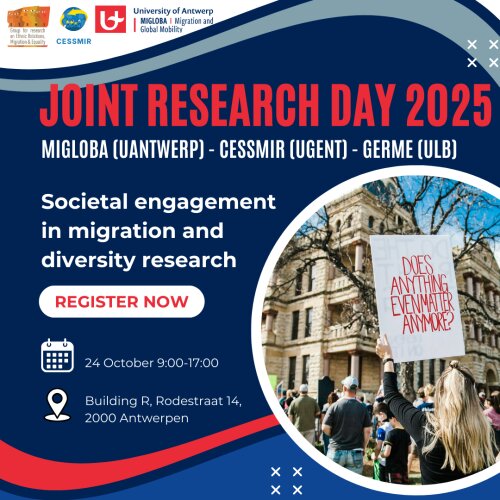
The joint MIGLOBA (University of Antwerp) – CESSMIR (UGent) – GERME (ULB) research day took place at the University of Antwerp, Building R, Rodestraat 14.
We had a day full of inspiring talks and ample possibilities for networking, during interactive workshops and over coffee and lunch.
PROGRAM
9.00 Welcome coffee
9.30 Welcome by the organising team
10.00 Keynote ‘Beyond Classrooms and Publications: Engaging Society in Migration and Diversity Research’ by Jofelle Tesorio (Utrecht University)
10.45 Break
11.15 Keynote ‘Migration scholars and policy makers: uneasy allies, enduring adversaries’ by prof. dr. Andrea Rea (ULB)
12.00 Keynote ‘From Empathy to Socio-Analysis: Reflections on the Posture of an Engaged Researcher alongside Undocumented Migrants’ by dr. Youri Vertongen (UCL)
12.45 Lunch
14.00-16.00: three parallel workshops
Workshop 1: Engaging with journalists (Karlien Beckers, de Standaard): Room SR 108
This workshop explores why and how migration researchers can engage with journalists to bring their work into wider public debates. Participants will reflect on ways to make complex findings more accessible, explore how to establish constructive media relationships, and discuss approaches to interviews or op-eds. The session will also address the ethical challenges of simplification, representation, and ensuring migrant voices are not overshadowed. Drawing on concrete examples and interactive exercises, the workshop will highlight how collaboration with journalists can amplify impact, counter misinformation, and foster more informed and inclusive discussions on migration.
Workshop 2: Engaging with policymakers (Emilie Peeters & Mieke Verrelst) Room SR 213
The workshop ‘Engaging with policymakers’ will explore why it is essential for researchers to connect their evidence with policy debates and how they can do this effectively. It will provide both theoretical insights and hands-on strategies, covering key elements such as bridging science and policy, understanding policy processes, and tailoring messages to policymakers’ needs. Participants will reflect on the benefits of engagement, ranging from increasing the societal impact of research to strengthening networks and visibility. They will be introduced to practical tools such as stakeholder mapping, developing clear recommendations, and identifying advocacy opportunities. Practical examples from the field of migration research will illustrate how evidence can inform debates, shape policy agendas, and contribute to more effective and inclusive outcomes.
Workshop 3: Scholar activism in times of genocide: Reflecting on our complicity with racial capitalism in academic settings (dr. Leila Mouhib and dr. Astrid Jamar) Room SR 119
For the past two years, Palestine questioned even further our ability to self-identify as critical researchers and/or scholar activists. Many of us, academic researchers based in European universities, consider ourselves to be critical voices seeking to have positive impact towards global challenges. As scholars mobilising deco/anti colonial perspectives, our academic engagement is inseparable from activist engagements within civil society, as well as a serious reconsideration of various impacts of epistemic hierarchies enforced through academic knowledge production about colonial violence, forced migration, and the coloniality of peace/migration/global governance. What does it mean to translate these critical voices into real life impacts as we witnessed genocide; as well as the refusal of our institutions to end their complicity with such blatant colonial violence? What did we learn in terms of complementarity, contradiction, and inherent complicity of our own efforts inside and outside university walls?
16.00: Closing comments
16.30: Closing coffe